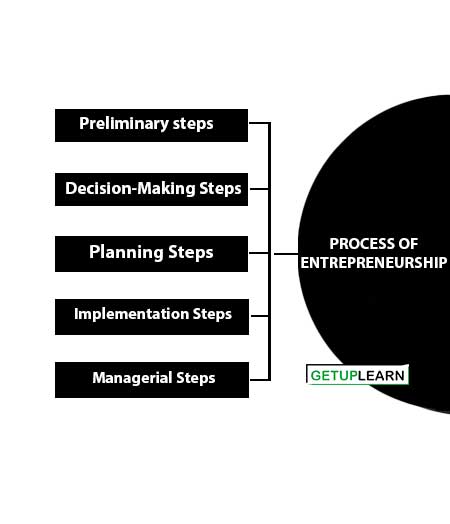Table of Contents
Process of Entrepreneurship
The entrepreneurial process is a step-by-step method that every entrepreneur needs to follow for setting up an enterprise. There are five steps in the process of entrepreneurship:
- Stage 1: Preliminary steps
- Stage 2: Decision-Making Steps
- Stage 3: Planning Steps
- Stage 4: Implementation Steps
- Stage 5: Managerial Steps

Stage 1: Preliminary steps
These are the initial steps that entrepreneurs need to follow for establishing a firm. At the very first stage, the to-be entrepreneurs should show their ability to make a decision that is going to affect the company.
It would be right to say the birth of an entrepreneur takes place at this stage. This is a significant stage as an entrepreneur searches for a business opportunity at this stage and collects data/information from all available sources.
Stage 2: Decision-Making Steps
These are the steps related to the decision-making of entrepreneurs. Entrepreneurs make efficient decisions on the basis of the lessons learned by them or as per their instinct or examples of other successful entrepreneurs.
In this step, the entrepreneur is generally seen consulting with the District Industrial Centre (DIC) and Micro, Small and Medium Enterprises (MSME). Some of the major decisions taken at this stage are as follows:
- Decisions concerning the acquisition of permission, recognition, and application.
- Decisions related to the acquisition of funds from banks or financial institutions.
- Decisions related to the development of a Preliminary Project Report (PPR).
- Decisions about the acquisition and arrangement of land, building, machinery, plant, raw material, labor, fuel, water supply, energy, filtration, etc.
Effective decisions that are adaptable and comfortable for the business enterprise, must consider all stakeholders and organizations who are directly or indirectly linked to the success of entrepreneurship.
Stage 3: Planning Steps
This stage is also a vital step of the entrepreneurial process as planning is considered an assumption or prediction of business needs and requirements to arrive at some anticipated outcome in the future.
It makes it possible to review the available options and choose the best strategy to run the business by bringing down expenses and maximizing profit. Some of the substantial planning steps include the following:
- Making plans for infrastructure such as plants and buildings.
- Taking permission and recognition from any reputed authority or government authority as needed.
- Requesting to concerned authorities for environmental clearance.
- Applying for licensing and purchasing of government-managed land if required.
- Requesting and applying to concerned authorities for electric connection and water supply.
- Making plans by considering the final feasibility, technical feasibility, and operational feasibility.
- Studying the PPR and preparing Detailed Project Report (DPR) Getting approval and release of loan and/or capital investment.
- Acquiring machinery and planning for installation.
Stage 4: Implementation Steps
This stage of the entrepreneurial process refers to the execution of the plan. It is the action taken by entrepreneurs to implement the plan so that the plans are put into action. Some vital steps that help in understanding how actions in planning steps are groomed into implementation steps are given as follows:
- Acquiring land, setting up buildings, and purchasing raw materials.
- Installing plant and machinery, and recruiting and selecting human resources.
- Getting permission and reorganization letters, and receiving capital investment.
- Initiating operation and production process.
- Arranging the fuel, electricity, and water supply requirements for business.
- Obtaining permission and assistance from authorities for the arrangement of infrastructural development, ie., road, hospital, school, and residence.
Implementation steps bring the plan into action so it is the most important and difficult step. It is only during implementation that the actual challenges come and are figured out to generate something of real value.
Stage 5: Managerial Steps
Entrepreneurs play various roles such as initiator, planner, organizer, and employer. Apart from this, entrepreneurs also do managerial duties which are also very important for them as well as for the organisation. Some of the vital managerial duties that every entrepreneur should take care of are as follows:
- Framing market policy and strategy.
- Arranging promotion of products or services.
- Deciding pricing policy.
- Managing retailers and wholesalers.
-
Benchmarking the profit margin.
- Managing marketing strategy.
- Managing advertisement of products or services.
- Managing distribution system for efficient distribution.
- Managing warehouse.
FAQs Section
What are the 7 stages of the process of entrepreneurship?
The 7 stages of the process of entrepreneurship are:
1. Stage 1: Preliminary steps
2. Stage 2: Decision-Making Steps
3. Stage 3: Planning Steps
4. Stage 4: Implementation Steps
5. Stage 5: Managerial Steps.



